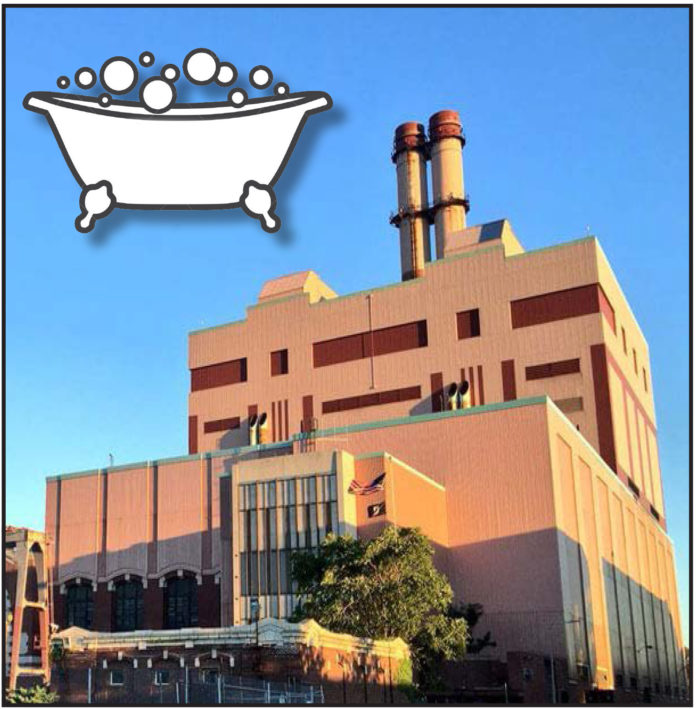Says A Hilco Executive Vice President after Edison meeting last Monday night
This week, hundreds filed into the Tynan for a public meeting to discuss the latest development proposal for the former Boston Edison Power Plant. For over three years, the Boston Planning & Development Agency have hosted public meetings to discuss the future use of the site. This past summer, the development team of Hilco/Redgate put forth two proposals for the site: commercial/retail option and a mixed-use option.
On Monday, the Hilco/Redgate development team made clear their intention to move forward with the mixed-use proposal for approximately 1.78 million square feet of space, which includes hundreds of luxury housing units as well as hotel space. The heights of several buildings in this recent proposal will be approximately 190 feet—although the development team did not have specific heights.
The proposal to include housing at the former Boston Edison has been a source of contention because the area is not zoned for residential housing. A further obstacle is the existence of a deed restriction that prohibits any housing from being built at the former Boston Edison. Held by the Commonwealth of Massachusetts, Massport negotiated the deed restriction with Exelon in 2014. Hilco/Redgate bought the former Boston Edison with these restrictions on housing in place.
Over $850 million in state and federal funds has been invested in Conley Terminal, brought in by Congressman Stephen Lynch and Nick Collins, the State Representative at the time. The International Longshoremen Association opposes housing at the site because of negative impacts to Conley Terminal. Located next to the former Boston Edison, Conley Terminal and the Butler Bypass Corridor have an economic impact of over $8.2 billion, supporting thousands of businesses throughout Massachusetts. The Port also supports over 9,000 direct jobs, making it one of the largest employers in the state.
The members of the Longshoremen, many who come from South Boston families, spoke about the negative impacts of luxury housing being built so close to an active port—referencing decreased hours and productivity at Moran Terminal in Charlestown, when housing was built next door. Their fear is that luxury housing at the Edison will have a similar effect on Conley and jeopardize those investments and productivity. The Teamsters Local 25, raised similar concerns at a meeting this summer.
Resident concerns again focused on the size and density of the proposal, transportation impacts, as well as environmental impacts from a contaminated power plant. One resident spoke about the overdevelopment of South Boston and the negative impacts to the neighborhood’s quality of life from this type of density. Others asked about the commercial/retail proposal.
One individual questioned Redgate about its involvement as a formal advisor for the 2014 Massport Strategic Plan, which highlighted the need for long-term protections of the Conley Terminal from negative impacts of residential development, leading to the deed restriction that prohibits housing at the former Edison, the very restriction that Redgate, as owners, now wants lifted.
Support for the current housing proposal came largely from members of the Boston Building Trades and local 26, representing hotel workers. However, one resident and member from Local 17 Sheet Metal Workers stated that the current proposal for the site needs to be further scaled back from its size and density.
Rep. David Biele, who was in attendance, informed the crowd that Redgate/Hilco had signed a project labor agreement which guaranteed that any project built by Redgate/Hilco at the former Edison would pay prevailing wages, and that the project labor agreement applied to any project at the site—whether commercial/retail or mixed-use. Rep. Biele stated that there are challenges to any development at the former Edison, given its proximity to Conley Terminal, and would set a precedent for the First Street Corridor with long-term impacts on the neighborhood.
Sen. Nick Collins was also in attendance, and rounded out concerns about the negative impacts to transportation, traffic, and Conley Terminal from the size and density of the current housing proposal. Sen. Collins also raised concerns about the lack of open space in the project, commenting that the current open space proposal would be under water based on projections by the Redgate/Hilco development team and contrasted the lack of open space with other projects in South Boston that have permanent green space/open space.
At the end of the meeting, one individual asked why a commercial/retail project could not go forward at the former Edison, stating it would accomplish two goals–addressing concerns about the impacts of housing on Conley while creating jobs for the trades.
Following the meeting, one South Boston woman was speaking with Hilco Executive Ben Spera about having a commercial/retail only project at the former Edison and about other projects by Hilco. Then, Mr. Andrew Chused, Executive Vice President at Hilco Redevelopment Partners, interjected himself into the conversation and stated he could “build as high as he wanted for a commercial project”, referencing an Amazon-like tower and asked, rhetorically, if that would make the community happy.
Mr. Chused then volunteered the comment that their project in Baltimore moved forward despite community concerns and brought in “quality jobs, quality buildings, and quality people.” When asked about his definition of “quality people,” Mr. Chused mentioned highly-educated individuals with high-
paying salaries. Mr. Chused was asked if he was from Baltimore and said no. When asked where he was from, he said Massachusetts. The South Boston woman then asked, “So, where in Massachusetts?” and Mr. Chused responded “it doesn’t matter… I’m sorry. I wasn’t born in a bathtub in South Boston.”
In terms of next steps, Redgate/Hilco hopes to start construction on this proposal as early as next year. The development expressed a desire to bypass the City of Boston’s demolition delay for this project because of the number of meetings that have already taken place. The development team will also pursue a planned development area for this location, which will spot-zone this project by overriding the underlying zoning. One local woman replied that there should be as many meetings as necessary to get this project right.
The comment period is open through November 8, 2019. Residents should direct comments to the BPDA and local elected officials:
And as far as forming an opinion about how the development team views the residents of South Boston… We’ll leave it to the good people of South Boston to decide.
BPDA Project Manager Tim Czerwienski – Tim.Czerwienski@boston.gov
City Councilor Ed Flynn – ed.flynn@boston.gov
City Councilor Michael Flaherty – Michael.f.flaherty@boston.gov
State Senator Nick Collins – Nick.Collins@masenate.gov
State Representative David Biele – david.biele@mahouse.gov













